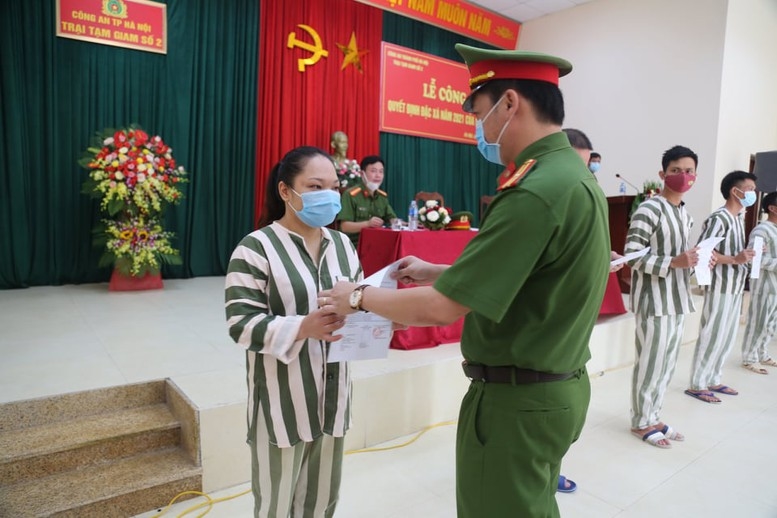Guidance for Implementation of pardon in Vietnam in 2024
The following article will provide detailed information on the guidance for Implementation of pardon in Vietnam in 2024

Guidance for Implementation of pardon in Vietnam in 2024 (Image from the internet)
On August 02, 2024, the Pardon Advisory Council issued Guidance href="https://lawnet.vn/vb/Huong-dan-88-HD-HDTVDX-2024-thuc-hien-Quyet-dinh-758-2024-QD-CTN-dac-xa-97537.html">88/HD-HDTVDX to implement Decision 758/2024/QD-CTN on Pardon in 2024.
Guidance for Implementation of pardon in Vietnam in 2024
(1) Subjects eligible for Pardon consideration in Vietnam
The subjects eligible for Pardon consideration are as follows:
- Persons sentenced to fixed-term imprisonment, life imprisonment reduced to fixed-term imprisonment currently serving their sentences in prisons, detention centers, or at criminal enforcement agencies of district-level police (hereinafter referred to as inmates).
- Persons temporarily suspended from serving prison sentences.
(2) Conditions for proposing Pardon consideration in Vietnam
Regarding some provisions in Article 3 of the Decision on Pardon in 2024, the Pardon Advisory Council provides specific guidance as follows:
- The regulation at point a, clause 1, Article 3 of the Decision on Pardon in 2024 is stipulated at point a, clause 1, Article 11 of the Pardon Law 2018 and detailed in clause 1, Article 4 of Decree 52/2019/ND-CP (hereinafter referred to as Decree No. 52).
According to point c, clause 1, Article 18 of Decree 133/2020/ND-CP detailing the implementation of some provisions of the Criminal Enforcement Law, the classification of prison sentence execution for the second quarter on May 25, and for the third quarter on August 25. Therefore, as of the time the prisons, detention centers, and district-level police criminal enforcement agencies meet to consider Pardon proposals, the inmates must have completed the classification period with a "good" or "fair" rating. From May 26, 2024, to the date of the meeting to consider Pardon proposals, the inmates must achieve a "good" or "fair" rating from the prison, detention center, or the district-level police criminal enforcement agencies. After obtaining the classification results of the third quarter of 2024, the prisons, detention centers, and district-level police criminal enforcement agencies must review and compare the previously proposed Pardon list and promptly propose the superior authority report to the Standing Committee of the Pardon Advisory Council for re-evaluation and propose removing those inmates not achieving a "good" or "fair" rating in the third quarter of 2024 from the Pardon proposal list.
For inmates temporarily suspended from serving prison sentences or subjected to compulsory medical treatment returning to prison, detention center, or district-level police criminal enforcement agencies to continue serving their sentences, in addition to the eligible classification quarters during the imprisonment period, a “good” or “fair” rating is required. The People's Committee of the commune where they reside, the military unit managing them during the temporary suspension period, or the medical facility treating them during the compulsory medical treatment period must confirm they have complied with the law.
- The time served is the time being detained, arrested, and imprisoned in prisons, detention centers, or district-level police criminal enforcement agencies, excluding the time on bail, postponed, temporarily suspended, or reduced prison sentence terms. The time under compulsory treatment during investigation, prosecution, trial, and sentence execution is also included in the prison time served.
The reduced prison sentence term is deducted from the remaining sentence duration.
Example: Nguyen Van A was sentenced to 12 (twelve) years in prison, arrested on September 30, 2016, and until September 30, 2024, he served 8 years and had 3 sentence reductions totaling 2 years. The remaining sentence is 2 years.
- Regarding the additional penalties of fines, court fees, property return, compensation, and other civil obligations:
+ Prisoners or those temporarily suspended from prison who have not completed additional penalties of fines or court fees but were exempted by the court also meet the condition in point c, clause 1, Article 3 of the Decision on Pardon in 2024.
+ Prisoners or those temporarily suspended from prison who have completed the obligation to return property, compensate, or fulfill other civil obligations as stipulated in point d, clause 1, Article 3 of the Decision on Pardon in 2024, are among the cases provided in clause 2, Article 4 of Decree No. 52. Moreover, the following cases are considered to have fulfilled compensation or civil obligations:
++ For maintenance obligations, the complete fulfillment according to the court's judgment or having paid one installment, confirmed by the commune-level People's Committee where they reside or by the civil judgment enforcement agency handling the case. If partially fulfilled or not yet fulfilled, but there is an agreement and confirmation from the legal representative of the victim or the recipient of maintenance about not continuing the obligation according to the court’s judgment, confirmed by the commune-level People's Committee where they reside or by the civil judgment enforcement agency handling the case, is also considered completed.
++ For minors committing a crime at age below 18 as stipulated in point d, clause 3, Article 3 of the Decision on Pardon in 2024, if the court verdict assigns compensation or other civil obligations to parents or legal representatives, they must provide proof of fulfillment, including receipts, invoices, documents, or suspension decisions by the competent civil judgment enforcement agency or a written agreement from the recipient not to enforce the obligation, confirmed by the commune-level People's Committee or the civil judgment enforcement agency handling the case or other documents proving the completion.
+ Those sentenced to imprisonment partially fulfilling property return, compensation, or other civil obligations, but facing outstanding economic hardship as specified by civil judgment enforcement laws in point d, clause 1, Article 3 of the Decision on Pardon in 2024, are provided for in clause 3, Article 4 of Decree No. 52.
- Those who made significant contributions while serving their sentences, suffering from fatal diseases, being chronically ill and unable to serve themselves, facing special family hardships, and being the sole family provider as provided in clause 3, Article 3 of the Decision on Pardon in 2024 fall under clauses 4, 5, 6, and 7, Article 4 of Decree No. 52.
(3) Cases not eligible for Pardon
To comply with Article 4 of the Decision on Pardon in 2024, the Pardon Advisory Council provides detailed guidance on some contents as follows:
- The basis for identifying cases specified in clause 8, Article 4 of the Decision on Pardon in 2024 are the points, clauses, articles in the Criminal Code applied by the court when deciding the penalty.
For cases of armed robbery as stipulated in clause 8, Article 4 of the Decision on Pardon in 2024, in addition to the above basis, reference the provisions of Article 3 of the Law on Management and Use of Weapons, Explosives, and Supporting Tools 2017 (amended 2019) to identify whether the object used to commit the crime was a weapon.
- For repeated robbery, repeated snatching, repeated theft (twice or more) stipulated in clause 8, Article 4 of the Decision on Pardon in 2024:
The basis for identifying repeated offenses is the number of offenses reflected in the judgment, and each offense being prosecuted in the same judgment or part of the judgment applying point g, clause 1, Article 48 of the Criminal Code 1999 or point g, clause 1, Article 52 of the Criminal Code 2015 (amended 2017).
Those serving aggregate sentences for multiple judgments on the same crime type but each judgment reflecting only one offense are still considered repeated offenders.
- The basis for determining drug abuse for cases under clause 12, Article 4 of the Decision on Pardon in 2024 includes documents in the inmate’s file and the temporary suspension execution file (for those temporarily suspended) such as:
Judgment; indictment; investigation documents; test results from district-level healthcare facilities or higher; self-declarations by inmates or those on temporary suspension specifying the time and frequency of drug use; medical examination forms from prison, detention center, district-level police criminal enforcement agencies signed (or fingerprinted) by the inmates admitting drug use; or other documents from the detention facility or competent agencies confirming the inmate or those on temporary suspension had unlawfully used drugs.
- Number of deputy directors of departments in Vietnam in accordance with Decree 45/2025/ND-CP
- Cases ineligible for pardon in Vietnam in 2025
- Decree 50/2025 amending Decree 151/2017 on the management of public assets in Vietnam
- Circular 07/2025 amending Circular 02/2022 on the Law on Environmental Protection in Vietnam
- Adjustment to the organizational structure of the Ministry of Health of Vietnam: Certain agencies are no longer listed in the organizational structure
- Vietnam aims to welcome 22-23 million international tourists in Vietnam in 2025
-

- Number of deputy directors of departments in Vietnam ...
- 15:04, 05/03/2025
-

- Cases ineligible for pardon in Vietnam in 2025
- 14:43, 05/03/2025
-

- Decree 50/2025 amending Decree 151/2017 on the ...
- 12:00, 05/03/2025
-

- Circular 07/2025 amending Circular 02/2022 on ...
- 11:30, 05/03/2025
-

- Adjustment to the organizational structure of ...
- 10:34, 05/03/2025
-

- Notable new policies of Vietnam effective as of ...
- 16:26, 11/04/2025
-
.Medium.png)
- Notable documents of Vietnam in the previous week ...
- 16:21, 11/04/2025
-
.Medium.png)
- Notable documents of Vietnam in the previous week ...
- 16:11, 02/04/2025
-
.Medium.png)
- Notable new policies of Vietnam to be effective ...
- 16:04, 02/04/2025
-
.Medium.png)
- Notable new policies of Vietnam effective from ...
- 14:51, 21/03/2025

 Article table of contents
Article table of contents
